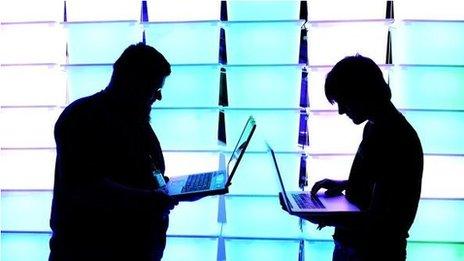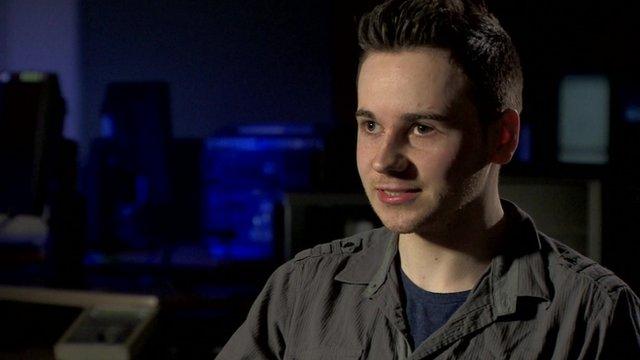LulzSec hacker helps FBI stop over 300 cyber attacks
- Published

Prosecutors called Mr Monsegur's help "extraordinary"
The former "leader" of hacking group LulzSec has helped the FBI stop more than 300 cyber attacks since his arrest on hacking charges in 2011.
The co-operation of Hector Xavier Monsegur has helped to prevent losses of millions of dollars, according to court documents filed by prosecutors.
Mr Monsegur will be sentenced on Tuesday for his role in major online hacking attacks.
Prosecutors have recommended that he receives a reduced sentence.
LulzSec was formed in approximately May 2011 when Mr Monsegur - also known as Sabu - and five other members of the Anonymous hacking movement joined forces.
According to the documents filed with the court, external the group was responsible for "major hacks" into and "thefts" from computer servers belonging to companies including Fox Television, Nintendo and Sony.
Mr Monsegur was arrested in June 2011 and pleaded guilty, as part of a co-operation agreement with the US government, to nine counts related to computer hacking, amongst others.
'Extraordinarily valuable'
The documents that were filed in a New York court last week state that Mr Monsegur's most substantial assistance came from his "co-operation against significant cybercriminals" affiliated with Anonymous, LulzSec and Internet Feds - another hacking group.
Because of his help the FBI say they were able to identify, prosecute and convict the "number one cybercriminal target in the world" at the time - Jeremy Hammond.

Mr Monsegur was the leader of hacking group LulzSec
He also helped prevent major hacking attacks that were being planned by active cybercriminals.
Mr Monsegur was in contact with hackers and received information from them about attacks that were being planned. He shared this knowledge with the FBI.
Victims of the attacks were to include the US Armed Forces, the US Congress and Nasa as well as a "television network, a video game manufacturer and an electronics conglomerate".
Electrical grid hack
"The FBI used this information, wherever feasible, to prevent or mitigate harm that otherwise would have occurred," the prosecutors' filing said.
"The FBI estimates that it was able to disrupt or prevent at least 300 separate computer hacks in this fashion.
"Although difficult to quantify, it is likely that Monsegur's actions prevented at least millions of dollars in loss to these victims."
He is also credited with providing officials with information about vulnerabilities that could have led to attacks on a water utility for a US city and a foreign energy company.
"Law enforcement used the information Monsegur provided to secure the water utility, and the information about the energy company was shared with appropriate government personnel," prosecutors said.
A hack on the US electrical grid was also found to be a hoax after Mr Monsegur communicated with members of Anonymous. This saved the government "substantial time and resources".
Under US sentencing guidelines Mr Monsegur could be sentenced to between 21 and 26 years in prison.
Prosecutors have called Mr Monsegur's help "extraordinarily valuable and productive" and have recommended that his sentence is limited to "time served". He has already spent seven months in jail after breaking conditions of his bail in 2012.
- Published16 May 2013

- Published16 May 2013

- Published8 March 2012
